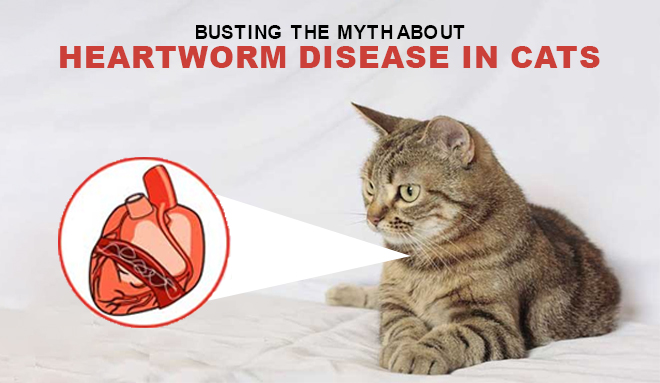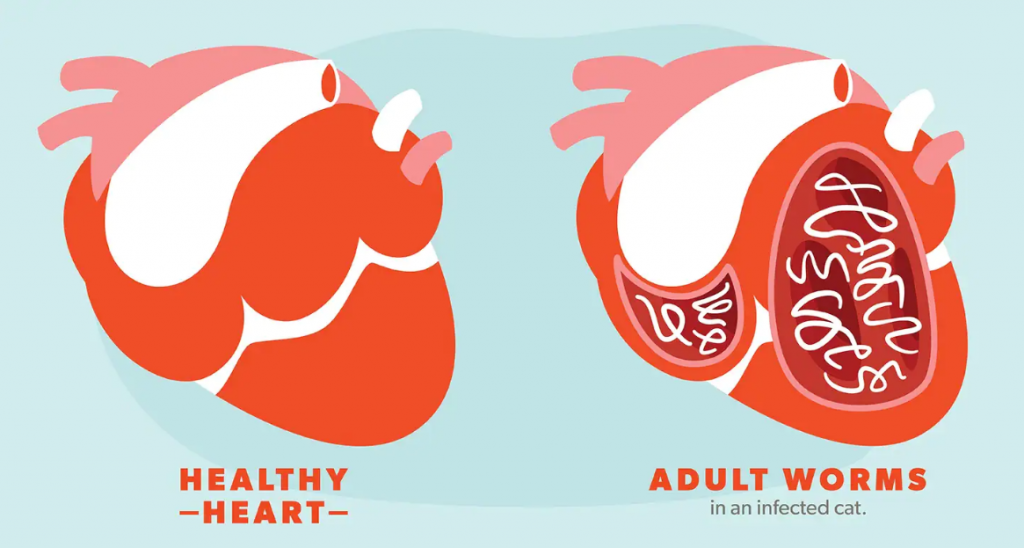Heartworm disease in cats is often neglected because many people have the misconception that they are not likely to get infected with the disease or have a very low chance of infection and that it can be easily treated at home, like other illnesses. However, all of these are not true.

Heartworm disease in cats requires much awareness, as many household cats have fallen victim to this negligence and lack of information. Thus, with this blog, we are here to bust some myths about heartworm disease in cats and bring to your knowledge the truth about heartworms in cats.
Heartworm disease in Cats?
Heartworm disease is a serious disease that may result in severe lung disease, heart failure, other organ damage, and death in pets, mainly dogs, cats, and ferrets. It is caused by a parasitic worm called Dirofilaria immitis.
The only way heartworm is spread is through a mosquito bite. Mosquitoes carry larvae from an infected animal and transmit larvae to another animal, making it a victim of heartworm.

Heartworm infection is different in cats than in dogs. In cats, heartworms grow long and the parasite burden is also lower. Only a few worms can heavily infect a feline. Respiratory symptoms are easily seen in cats which indicates the possibility of heartworm disease.
There are two instances when cats display symptoms of heartworm disease: when the immature heartworms enter their heart and lung arteries, and second is when adult heartworms perish.
Busting Common Myths Around Heartworms in Cats
Myth 1: Heartworm is a dog disease. Heartworm affects furry animals, including dogs, cats, and ferrets.
Cats are likely to get infected with heartworms in the same manner as dogs, through mosquito bites. Scientific studies have found that heartworm infection in cats is more common than other infections like FeLV FIV. Research shows that over 26% of cats get infected with heartworm larvae at some point in their lives, out of which 10% result in adult heartworm.
Myth 2: Heartworm Disease Primarily Affects a Cat’s Heart
Heartworm infection not only affects the heart but also the lungs and other organs. The term is a misnomer when it comes to infection. It affects respiratory organs and other cardiovascular diseases.
Myth 3: There’s a Treatment for Heartworm Disease in Cats.
For cats, there is no treatment that kills heartworms the treatments available, only focus on reducing the inflammation in any organs or the symptoms of the disease until the worms die on their own. Since there is no reliable treatment for heartworm in cats, preventive treatment is vital and should be administered to cats at the recommended intervals.
Myth 4: My Kitten is Too Young for Me to Worry about Heartworm Disease.
Age has nothing to do with heartworm infection. Kittens or cats of any age can be infected by mosquitoes carrying the disease and thus are likely to get infected with the worm.
Myth 5: I can stop giving my pet heartworm prevention during the winter.
Mosquitos in winters are less compared to summers, but the chances of heartworm still prevail. It will only take one mosquito bite to transmit heartworm larvae to your feline. Therefore, veterinarians recommend administering heartworm preventive treatment to cats every month, all year long.
Myth 6: Skipping a dose or two of my pet’s heartworm preventive is not a big deal.
Heartworm prevention works retroactively. Whether you administer a pill, spot-on solution, or injectable to your pet, every treatment has a specific period of its effectiveness. As soon as it passes its efficacy duration, it may expose your cat to infection and disease. Thus, it’s critical to repeat heartworm prevention treatment on the same date every month or as per the recommended duration mentioned on the product label.
Bottom Line
As you may already know, heartworm prevention is crucial in safeguarding your cat’s health against this deadly disease. The best way to protect your cat from heartworm is prevention.
It’s essential to consult with your veterinarian and explore the available options for heartworm preventives that are suitable for your cat. Administer the appropriate dosage every month or as advised by your veterinarian. Remember, prevention is the key to keeping your feline friend healthy and happy.

